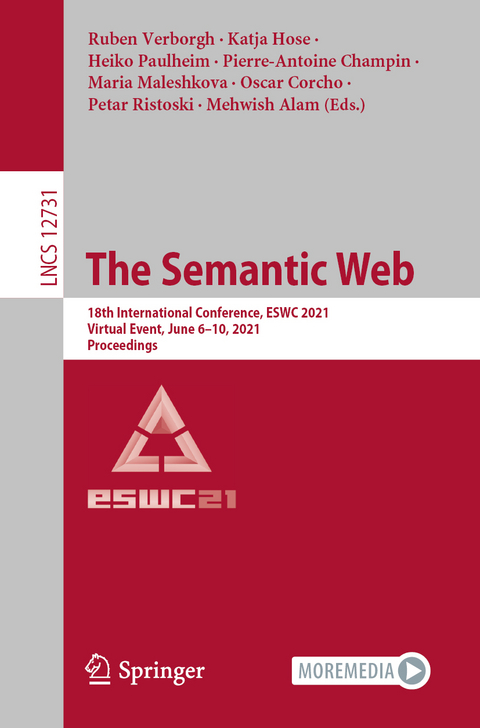
The Semantic Web
Springer International Publishing (Verlag)
978-3-030-77384-7 (ISBN)
This book constitutes the refereed proceedings of the 18th International Semantic Web Conference, ESWC 2021, held virtually in June 2021.
The 41 full papers and 2 short papers presented were carefully reviewed and selected from 167 submissions. The papers were submitted to three tracks: the research track, the resource track and the in-use track. These tracks showcase research and development activities, services and applications, and innovative research outcomes making their way into industry. The research track caters to both long-standing and emerging research topics in the form of the following subtracks: ontologies and reasoning; knowledge graphs (understanding, creating, and exploiting); semantic data management, querying and distributed data; data dynamics, quality, and trust; matching, integration, and fusion; NLP and information retrieval; machine learning; science data and scholarly communication; and problems to solve before you die.
Ontologies and Reasoning.- Streaming Partitioning of RDF Graphs for Datalog Reasoning.- Parallelised ABox Reasoning and Query Answering with Expressive Description Logics.- Analysing Large Inconsistent Knowledge Graphs using Anti-Patterns.- Processing SPARQL Property Path Queries Online with Web Preemption.- Ontology-Based Map Data Quality Assurance.- Knowledge Graphs (Understanding, Creating, and Exploiting).- Applying Grammar-based Compression to RDF.- HDT Bitmap Triple Indices for Efficient RDF Data Exploration.- Programming and Debugging with Semantically Lifted States.- Do Embeddings Actually Capture Knowledge Graph Semantics?.- A Semantic Framework to Support AI System Accountability and Audit.- Semantic Data Management, Querying and Distributed Data.- Comparison Table Generation from Knowledge Bases.- Incremental Schema Discovery for RDF Data at Scale.- HTTP Extensions for the Management of Highly Dynamic Data Resources.- Expressibility of OWL Axioms with Patterns.- Data Dynamics, Quality, and Trust.- Refining Transitive and pseudo-Transitive Relations at Web Scale.- Data Reliability and Trustworthiness through Digital Transmission Contracts.- Matching, Integration, and Fusion.- Neural Knowledge Base Repairs.- Natural Language Inference over Tables: Enabling Explainable Data Exploration on Data Lakes.- NLP and Information Retrieval.- Grounding Dialogue Systems via Knowledge Graph Aware Decoding with Pre-trained Transformers.- WEB-SOBA: Word Embeddings-Based Semi-automatic Ontology Building for Aspect-Based Sentiment Classification.- Context Transformer with Stacked Pointer Networks for Conversational Question Answering over Knowledge Graphs.- Machine Learning.- Neural Multi-Hop Reasoning With Logical Rules on Biomedical Knowledge Graphs.- Augmenting Ontology Alignment by Semantic Embedding and Distant Supervision.- Convolutional Complex Knowledge Graph Embeddings.- RETRA: Recurrent Transformers for Learning Temporally Contextualized Knowledge Graph Embeddings.- Injecting Background Knowledge into Embedding Models for Predictive Tasks on Knowledge Graphs.- Science Data and Scholarly Communication.- Structured Semantic Modeling of Scientific Citation Intents.- Discovering Research Hypotheses in Social Science using Knowledge Graph Embeddings.- Problems to Solve Before You Die.- Towards a Linked Open Code.- A Polyvocal and Contextualised Semantic Web.- Resources.- The WASABI dataset: cultural.- RuBQ 2.0: An Innovated Russian Question Answering Dataset.- A Knowledge Organization System for the United Nations Sustainable Development Goals.- RSP4J: An API for RDF Stream Processing.- WasmTree: Web Assembly for the Semantic Web.- ParaQA: A Question Answering Dataset with Paraphrase Responses for Single-Turn Conversation.- kgbench: A Collection of Knowledge Graph Datasets for Evaluating Relational and Multimodal Machine Learning.- The SLOGERT Framework for Automated Log KnowledgeGraph Construction.- P2P-O: A Purchase-To-Pay Ontology for Enabling Semantic Invoices.- KOBE: Cloud-native Open Benchmarking Engine for Federated Query Processors.- CSKG: The CommonSense Knowledge Graph.- In-Use Track.- A Knowledge Graph-based Approach for Situation Comprehension in Driving Scenarios.- Pay-as-you-go Population of an Automotive Signal Knowledge Graph.
| Erscheinungsdatum | 28.05.2021 |
|---|---|
| Reihe/Serie | Information Systems and Applications, incl. Internet/Web, and HCI | Lecture Notes in Computer Science |
| Zusatzinfo | XXI, 738 p. 179 illus., 130 illus. in color. |
| Verlagsort | Cham |
| Sprache | englisch |
| Maße | 155 x 235 mm |
| Gewicht | 1145 g |
| Themenwelt | Informatik ► Datenbanken ► Data Warehouse / Data Mining |
| Schlagworte | Applications • Artificial Intelligence • Computational Linguistics • Computer Science • conference proceedings • Databases • HCI • Human-Computer interaction • Informatics • Information Retrieval • Internet • Knowledge-Based System • Natural Language Processing • NLP • Ontologies • Query Languages • query processing • Research • resource description framework • Search Engines • Semantics • semantic web • Signal Processing • World Wide Web |
| ISBN-10 | 3-030-77384-1 / 3030773841 |
| ISBN-13 | 978-3-030-77384-7 / 9783030773847 |
| Zustand | Neuware |
| Haben Sie eine Frage zum Produkt? |
aus dem Bereich


